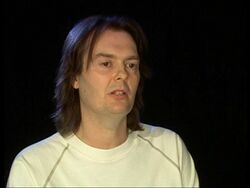Andrew Cartmel: Difference between revisions
m (making sure all imdb refs have a preceding asterisk; pass one) |
m (getting rid of double asterisks around imdb template) |
||
| Line 49: | Line 49: | ||
==External links== | ==External links== | ||
*[http://www.bbc.co.uk/cult/news/drwho/2004/01/01/13691.shtml Interview with Cartmel on the BBC ''Doctor Who'' website] | *[http://www.bbc.co.uk/cult/news/drwho/2004/01/01/13691.shtml Interview with Cartmel on the BBC ''Doctor Who'' website] | ||
*{{imdb name|id=0142083|name=Andrew Cartmel}} | |||
{{Wikipedia|Andrew_Cartmel}} | {{Wikipedia|Andrew_Cartmel}} | ||
Revision as of 05:04, 18 July 2011
Andrew Cartmel was the script editor for the classic series of Doctor Who during its last three seasons. Raised in Canada, he took a post-graduate course in Computer Studies and worked on computer-aided design for Shape Data Ltd (now UGS Corp) in Cambridge, England during the mid-1980s, before he turned more to writing and managed to gain an agent on the strength of two unproduced scripts, also attending workshops run by the BBC Television Drama Script Unit.
Biography
In 1987, Cartmel was hired as the script editor for the twenty-fourth season of Doctor Who, having been recommended to the producer John Nathan-Turner by the producer's agent, who had seen some unproduced scripts Cartmel had written. Cartmel worked on the programme for the next two years, overseeing the final three seasons of its original run on BBC One. He brought in several new writers, taking the series in a new creative direction. Although he is not credited with writing any of the serials under his watch himself, he is credited with composing the key monologue delivered by Sylvester McCoy at the end of Survival episode 3 -- the final episode of the original 1963-89 series.
The most lasting legacy of this new direction was the so-called "Cartmel Masterplan", a backstory developed with other writers that restored some of the mystery of the Doctor's background and eventually would explain exactly who he was. Unfortunately, although hints were dropped in the last two seasons, the proposed revelations never materialized on screen as the programme was taken off the airwaves in 1989.
However, even if Doctor Who had not come to an end in 1989 Cartmel would have left the show anyway, as he had already been head-hunted due to his success there to take over the script editor's role on the BBC's hugely popular medical drama series Casualty.
After one season working on Casualty in 1990, Cartmel left the television industry for the rest of the decade. During the 1990s he wrote comic strips for Judge Dredd Megazine and Doctor Who Magazine and three Doctor Who novels for Virgin Publishing in their New Adventures series. This series had used elements of the "masterplan" as part of their overall story arc for the Doctor, particularly the last Seventh Doctor novel Lungbarrow, written by Marc Platt.
In 1999 his first original novel, The Wise, was published in Virgin's short-lived series of new science-fiction novels, Virgin Worlds. The same year, he became editor of the science-fiction magazine Starburst, although the appointment was a short one and he left the magazine in 2000. In 2001 he returned to television as the script editor on the second season of Channel 5's fantasy / adventure series Dark Knight, writing what proved to be the series' final episode at the end of the season. He also wrote a stage thriller with Gothic overtones, End of the Night, which was successfully staged by Long Shadow Productions in the summer of 2003.
In the 2000s he has also returned to Doctor Who fiction, writing the script Winter for the Adept for Big Finish Productions' range of Doctor Who audio dramas in 2000, a novella, Foreign Devils, for Telos Publishing in 2003, and the BBC Books novel Atom Bomb Blues in 2005.
Cartmel had several other books published in 2005. Script Doctor - The Inside Story of Doctor Who 1986-89 is an account of his work on the Doctor Who television series. There was also another Doctor Who non-fiction book, Through Time: An Unofficial and Unauthorised History of Doctor Who.
He lives in London and is currently lecturing at Saint Mary's College, Surrey.
Bibliography
Comics
- Doctor Who (in Doctor Who Magazine #164-166, 175-178, 180 & 188-190, 1990-92)
- Doctor Who: Evening's Empire (in Doctor Who Classic Comics Autumn Holiday Special 1993)
Novels
- Cat's Cradle: Warhead (1992)
- Warlock (1995)
- Warchild (1996)
- Atom Bomb Blues (2005)
- Consequences (2009)
Novellas
Short Stories
- Certificate of Destruction (in Short Trips: Time Signature)
- Christmas in Toronto (in Short Trips: Christmas Around the World)

